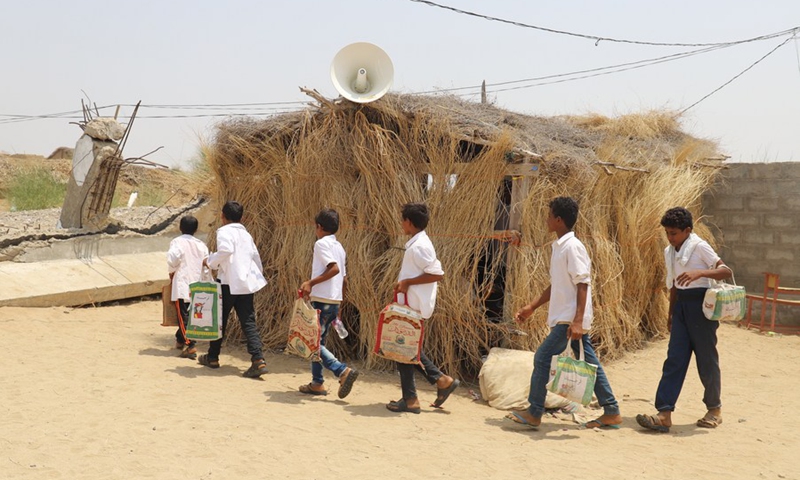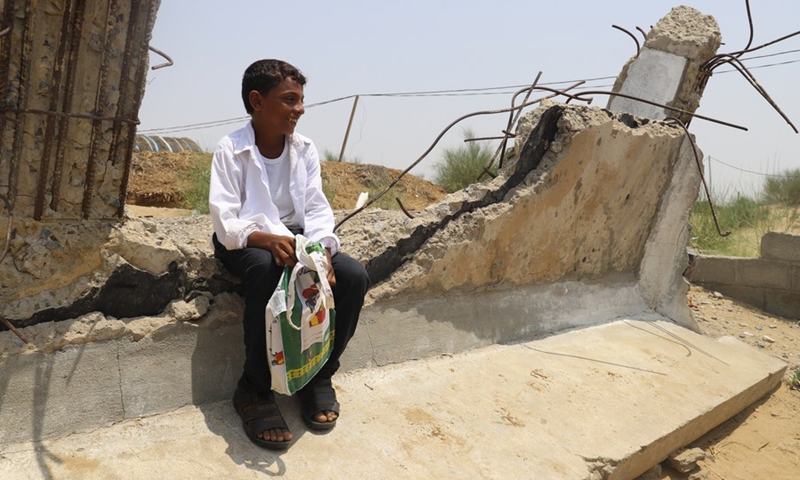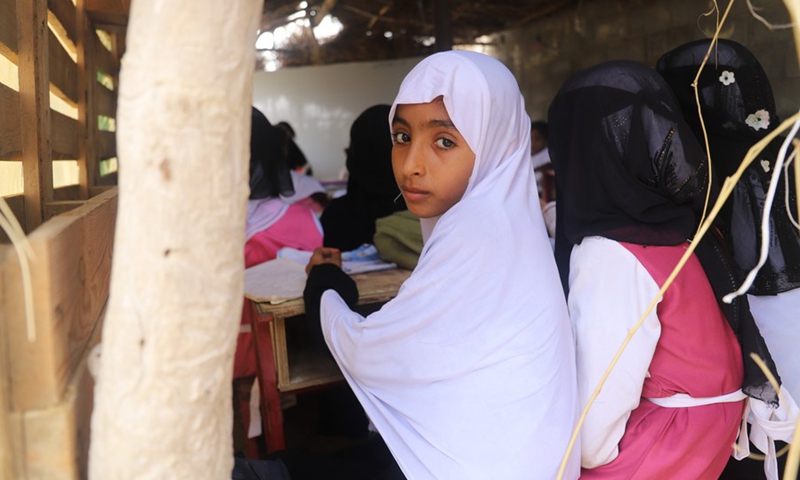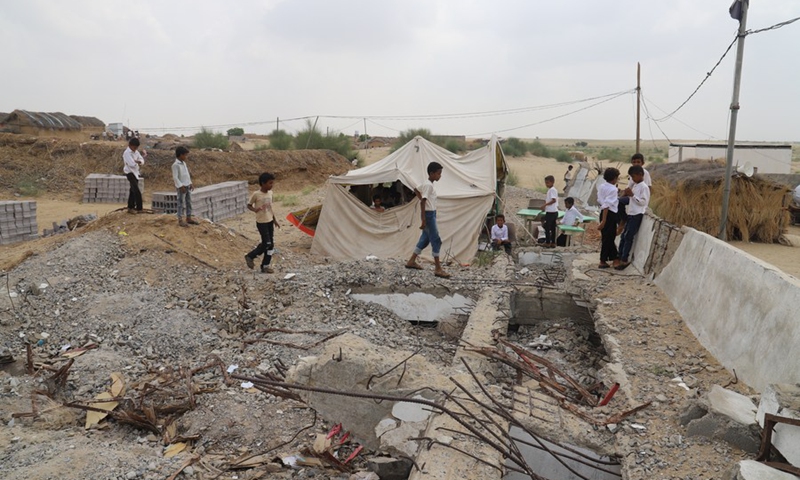
Carrying school bags made from food bags, children line up to enter their straw hut classroom at a primary school in Hajjah Province, Yemen, Sept. 20, 2021.(Photo: Xinhua)

A boy sits at the ruins of school buildings at a primary school, which has tents, straw huts and wooden cabins as classrooms, in Hajjah Province, Yemen, Sept. 20, 2021.(Photo: Xinhua)

A schoolgirl is seen inside a hut-like classroom at a primary school in Hajjah Province, Yemen, Sept. 20, 2021.(Photo: Xinhua)

Children walk past ruins of school buildings at a primary school, which has tents, straw huts and wooden cabins as classrooms, in Hajjah Province, Yemen, Sept. 20, 2021.(Photo: Xinhua)
In northern Yemen, many schools were bombed and pulverized as the civil war continues with no end in sight.
The Ali bin Abi Talib school in the Red Sea town of Midi in Hajjah province is one of them.
The local government authorities built makeshift classrooms from tents, wooden planks, and straw in the schoolyard to start the new academic year for 350 schoolchildren.
"Our school had been bombed. We now study in a tent in the schoolyard," Abdo Ali told Xinhua as he prepares to go to the school.
The 12-year-old boy lives with his parents in a hut in the outskirts of Midi. They returned along with many other families to the coastal town after the government forces recaptured it from the Houthi militia more than two years ago.
His father made him an office table out of empty wooden ammunition boxes he found after the battles.
"Our living situation is getting worse. Our children are paying the price of war," said the father.
Abdo uses a small, empty rice sack as a schoolbag and walks a long distance to school every day like many of his classmates. Many students do not have shoes.
"I fear that I might not be able to continue my education. My family's living condition is deteriorating and the war is causing great suffering to my parents," Abdo said as he walks to the school.
The school was destroyed, leaving only part of the outer wall standing. Students walk over fallen concrete pillars and a roof collapsed to the ground to reach their makeshift classrooms made of tents, timber, and thatch.
Students say that studying in these tents is better than nothing.
According to a recent report issued by the United Nations Children's Fund (UNICEF), over 2 million schoolchildren in Yemen are now out of school as poverty, conflict and lack of opportunities disrupt their education.
The school's headteacher Abdullah Mutanbek said that the temporary classrooms were built after the removal of many of the landmines that were planted in and around the school.
"We built the makeshift classrooms, tables and chairs after the army forces removed landmines planted in and around the school ... they removed 15 landmines from this school," Mutanbek told Xinhua.
Yasser Al-Rouhani, head of the Engineering Division for Demining in the 5th Military Region in Midi, said the searching for landmines in the town is continuing.
"So far, we have cleared more than 50,000 landmines, explosive devices and unexploded shells in Midi and the neighboring liberated districts that were planted near citizens' homes, roads, farms, and schools," Al-Rouhani told Xinhua in an interview.
Military experts here estimate that hundreds of thousands of landmines are still buried under the sand, threatening the residents and returnees from internally displaced camps.
Yemen has been mired in a civil war since late 2014, when the Houthi militia stormed several northern provinces and pushed the internationally recognized government of President Abd-Rabbu Mansour Hadi out of the capital Sanaa.
The war has killed tens of thousands, forced 4 million to flee and pushed the country to the brink of famine.
Fatima Jarbahi, head of the Education Office in Midi, said the efforts are continuing to support the educational process despite the heavy damages in the schools.
"A total of 28 schools were bombed in Midi and the neighboring district of Hayran, of which 17 were completely destroyed," she told Xinhua.
According to a recent report by the International Committee of the Red Cross (ICRC), the war in Yemen has damaged or destroyed "more than 2,500 schools across the country, depriving more than 2 million students of education."
In Houthi-controlled areas, many teachers have stopped teaching because their salaries have not been paid.
According to the UNICEF report, two thirds of teachers in Yemen have not received regular salaries in more than four years, which "puts around 4 million additional children at risk of disrupted education or dropping out as unpaid teachers quit teaching to find another financial source for providing their families."
